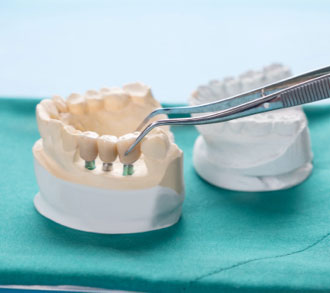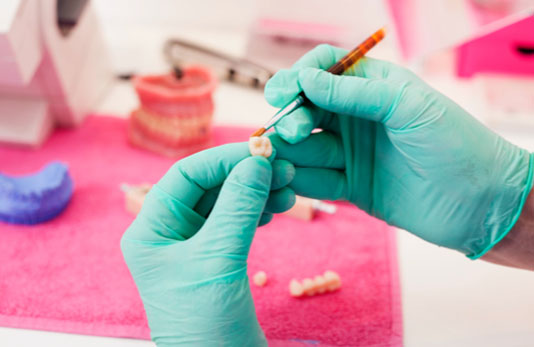What’s the difference between a bridge and an implant?

At some point in your life, you may need to have one or more teeth replaced. Should you choose a bridge or implant? Both options have a long history as reliable tooth replacements, but each has advantage and disadvantages.
What’s an implant?
An implant is an “anchor” surgically inserted into the jawbone that serves as a stable base for an artificial replacement tooth.
Implant surgery is a three-step process performed in your dentist’s office that can take five to nine months or longer, depending on how long your mouth takes to heal after each step.
What are the pros of an implant?
-
- No impact on other teeth. Implants can replace teeth individually, so surrounding teeth aren’t affected.
- Durability. Implants can last 10 to 15 years because the implant's metal root, typically made of titanium, naturally fuses with your jawbone.
- Prevents bone loss. A missing tooth can accelerate bone loss. An implant serves as a substitute tooth root, which helps preserve jaw structure.
-

What are the cons of an implant?
- Requires surgery. The implant must be inserted into your jawbone surgically.
- Time. After the implant is placed, bone usually takes three to six months to develop around it. Next a post is attached, and the gum tissue surrounding the post needs several months to heal. Some people require a longer recovery than others.
- Expense. Not all dental plans cover implants. Because it’s a multi-step process, an implant is more expensive than a bridge.
What’s a bridge?
A traditional bridge is a permanent dental prosthetic. It consists of two crowns with an artificial tooth in the middle that replaces a missing tooth. The crowns and artificial tooth can be made of gold, alloys, porcelain or a combination of materials, and are made in a laboratory as one piece.
The teeth on either side of the artificial tooth are shaped (filed) by the dentist to place crowns on them.
The dentist cements the bridge into your mouth.
What are the pros of a bridge?
- Permanent. Unlike other prosthetic options such as a denture, a bridge doesn’t have to be removed for cleaning because it’s cemented to your adjacent teeth. You can clean the bridge while cleaning your other teeth.
- Faster than an implant. The process can usually be completed within two dental visits, although this can vary depending on your oral health.
- Quick adjustment period. Because it’s small and lightweight, a bridge takes less time to get used to compared to some other dental prosthetics.
What are the cons of a bridge?
- Hard to brush and floss. With a bridge, you must brush and floss under the artificial tooth. To do this, you may have to use tools you’re not accustomed to, such as a floss threader.
- Shorter lifespan than an implant. A dental bridge typically lasts about 10 years because of the wear on neighboring teeth, which remain susceptible to gum disease and decay. (Their decay means less support for the bridge.)
- Impact on nearby teeth. A bridge requires support from neighboring teeth to hold the artificial tooth in place. If these teeth aren’t strong enough for crowns, a bridge might not be possible.
Are there other considerations?
If your tooth has been missing for a long time, a bridge might be a better option because your jaw may not be able to properly secure an implant. You may be able to get a bone graft to enable your jawbone to hold an implant, but this procedure will require additional time and cost.
What about the cost difference?
A bridge is generally less expensive than an implant. As with any major procedure, find out what your dental plan covers — many plans will pay for a bridge but not an implant. Ask your dentist to submit a pre-treatment estimate to us so you’ll know your out-of-pocket costs in advance.
Last updated September 21, 2021
Related articles:
The oral health information on this website is intended for educational purposes only. Always consult a licensed dentist or other qualified health care professional for any questions concerning your oral health.

